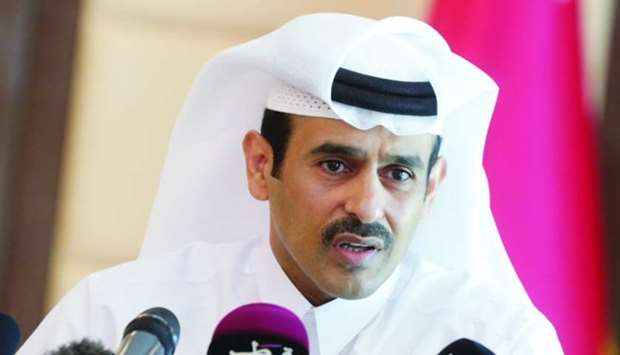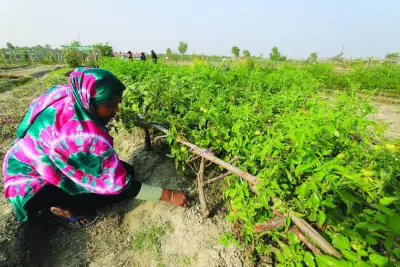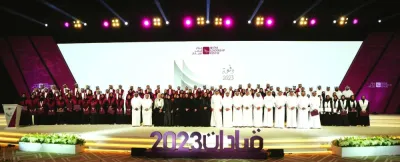* Qatar's strategy remain focused on core business - development of gas, says HE the Minister of State for Energy Affairs Saad Sherida al-Kaabi
Qatar will withdraw from the Organisation of the Petroleum Exporting Countries (Opec) with effect from January 1, 2019, HE the Minister of State for Energy Affairs Saad Sherida al-Kaabi said Monday.
Qatar joined Opec in 1961, one year after the organisation's establishment. Currently, the Vienna-headquartered bloc comprises 15 oil-producing and exporting countries.
Al-Kaabi said, “Our strategy is to remain focused on its core business and activities in Qatar and to enhance Qatar’s international standing as the world’s leading natural gas producer.”
The minister said “Qatar has worked (through QP) to develop and increase our LNG production from 77mn tonnes per year to 110mn tons” by 2024.
He said the global oil market will not be affected by the move, since Qatar "is not a high volume producer of oil."
"Qatar's decision to exit Opec is not political, it was purely a
business decision for Qatar's future strategy towards the energy sector," QNA quoted al-Kaabi as saying.
Qatar is OPEC’s 11th-biggest oil producer, accounting for less than 2% of total output, a Bloomberg dispatch showed.
Qatar was the first country to join Opec after the five founding nations -- Iran, Iraq, Kuwait, Saudi Arabia and Venezuela -- formed the group in 1960. It’s the first Middle
Eastern nation to leave the group, Bloomberg said.
Al-Kaabi said, "A lot of people will politicise it (Qatar’s Opec withdrawal). I assure you this purely was a decision on what's right for Qatar, long term. It's a strategy decision."
Making a statement at a packed media event at the Qatar Petroleum headquarters here on Monday, al-Kaabi noted, “Qatar has worked diligently during the past few years to develop a future strategy in the oil and gas sector based on growth and expansion, both in its activities in Qatar and internationally.
“This strategy, he underlined, has driven the expansion of our international upstream footprint to reach countries like Brazil, Mexico, Argentina, Cyprus, Congo, South Africa, and the Sultanate of Oman, to name a few.
"Moreover, in the next few months we will be announcing several major international partnerships. Our objective in this strategy was to remain focused on our core business and activities in Qatar, and to enhance Qatar's international standing as the world's leading natural gas producer.”
He also noted Qatar Petroleum's plans to raise its production capability from 4.8mn barrels oil equivalent a day to 6.5mn barrels oil equivalent a day during the next decade.
Al-Kaabi said, “In light of such efforts and plans, and in pursuit to strengthen Qatar’s position as a ‘reliable and trustworthy’ energy supplier across the globe, we had to take steps to review Qatar’s role and contributions on the international energy scene.
“We also sought ways to enhance that role and those contributions in a manner that helps achieve our strategy and objectives in the long term.”
He said, “It has become clear to us that achieving our ambitious strategy will undoubtedly require focused efforts, commitment and dedication to maintain and strengthen Qatar’s position as a leading LNG producer.”
Al-Kaabi told reporters that “The decision (to withdraw from Opec) was communicated to the secretary general this morning.”
The minister “reaffirmed Qatar’s pride in its international standing at the forefront of natural gas producers, and as the biggest LNG exporter- the cleanest fossil fuel, which has given Qatar a strong and resilient economy.”
Asked whether the Opec pull out decision was a political one, al-Kaabi said, “The decision was only for technical reasons related to Qatar's future strategy towards the energy sector.”
Since 2013, the amount of oil Qatar produced has steadily declined from about 728,000 barrels per day in 2013 to about 607,000 barrels per day in 2017, or just under 2% of Opec’s total output, Al Jazeera English said.
Meanwhile, total production during the same period increased from 30.7mn barrels per day to 32.4mn barrels per day.

HE the Minister of State for Energy Affairs Saad Sherida al-Kaabi addressing a press conference at the Qatar Petroleum headquarters. Picture: Jayan Orma



